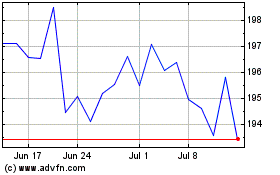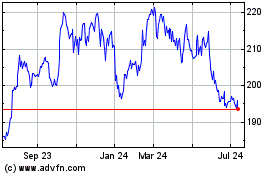UPDATE: NYSE, Deutsche Boerse Face Questions As Deal Nears Brink
January 11 2012 - 2:17PM
Dow Jones News
NYSE Euronext (NYX) and Deutsche Boerse AG (DB1.XE, DBOEF) will
be forced to rethink fundamental aspects of their plans to grow
trading services if the European Union nixes their deal, which
investors and analysts see as increasingly likely.
Remaining independent would upend both firms' strategies for
deepening their business in processing financial transactions,
especially in sophisticated swap deals, and poses a setback for
efforts to forge partnerships in fast-growing Asian markets.
EU antitrust examiners on Tuesday recommended prohibiting the
deal from moving forward, their chief concern being the potential
for a European monopoly being formed in exchange-traded futures and
options, according to a senior EU official.
The merger candidates have yet to receive notice of the
recommendation, but NYSE Euronext Chief Executive Duncan Niederauer
on Wednesday called the analysis "fundamentally flawed" because it
overlooks competing markets in privately traded derivatives as well
as overseas rival exchanges.
Executives of both companies met to discuss the merger Wednesday
in a pre-scheduled meeting. Final say on the transaction lies with
the 27 EU commissioners, who are slated to formally discuss the
matter on Feb. 1 and due to deliver a ruling by Feb. 9.
Shares in Deutsche Boerse closed down 1.2% at EUR41.16 and NYSE
Euronext shares were off 0.9% at $27.55, with stock market
benchmarks generally lower Wednesday.
Analysts have diverged on whether the companies may be better
off without their deal. Niamh Alexander, an analyst with Keefe
Bruyette & Woods, on Wednesday downgraded NYSE Euronext to
market perform from outperform on a "very low probability" of the
merger closing, and this expectation now being factored into the
stock price.
Sandler O'Neill analyst Rich Repetto on Tuesday determined that
NYSE Euronext was worth more as an independent company, around $30
per share. Some investors believe that the merger plan has weighed
on the stock since it would enlarge NYSE's exposure to Europe,
where an ongoing debt crisis and potential tax on trading represent
threats to financial services firms.
UBS analyst Arnaud Giblat lowered his price target for Deutsche
Boerse's stock to EUR56 from EUR60, saying he now forecasts only a
20% likelihood of a deal happening compared with 50% before, and
that his previous price target included EUR8 a share in expected
deal synergies. He said "political will" among European regulators
to approve the merger was still there, as a merged company would
put European regulators in a better position to oversee securities
trading.
Executives of the exchanges continue to back their deal as the
best long-term plan for their shareowners and for customers, who
would see an estimated EUR3 billion in savings on collateral by
combining trade-clearing services.
Should the EU block the tie-up, NYSE Euronext must reassess its
clearing plan. The New York Stock Exchange parent ahead of the
Deutsche Boerse deal had intended to create its own trade-clearing
facility to back its European markets, reducing reliance on
London-based clearer LCH.Clearnet and adding a new stream of
revenue.
Those plans were put on hold after the exchanges struck their
deal, which aims to route NYSE Euronext's trading to Deutsche
Boerse's existing clearinghouse.
James Rothenberg, an investor in NYSE Euronext, said Wednesday
he had suggested to executives an alternative joint venture on
trade-clearing between the companies to gain some of the planned
cost savings, and could also allow some collaboration on new
contracts. The different structure could make it more acceptable to
EU regulators, he said.
Both firms would also have to reassess plans to win business
from bank-dominated swap markets. Regulators seek to move such
transactions into clearinghouses and regulated trading platforms in
an effort to reduce systemic risk.
The enlarged and more-efficient clearinghouse of the merged
entity was seen as a powerful magnet for such trading, but on their
own neither NYSE Euronext or Deutsche Boerse has made as much
headway in the market as U.S.-based competitors like
IntercontinentalExchange Inc. (ICE) and CME Group Inc. (CME).
NYSE Euronext and Deutsche Boerse would also face renewed
pressure to strengthen ties to Asian markets, which in 2010 became
the world's busiest region for derivatives trading by contract
volume and has emerged as a key source of new share-listings.
Both exchange groups already maintain their own ties to some
exchanges in the region, but executives had pitched the merged
company as the preferred partner to fast-growing Asian platforms,
particularly in China, where CME, ICE and Nasdaq OMX Group Inc.
(NDAQ) have been laying their own groundwork.
-By Jacob Bunge and Ulrike Dauer, Dow Jones Newswires; 312 750
4117; jacob.bunge@dowjones.com
CME (NASDAQ:CME)
Historical Stock Chart
From Jun 2024 to Jul 2024

CME (NASDAQ:CME)
Historical Stock Chart
From Jul 2023 to Jul 2024
